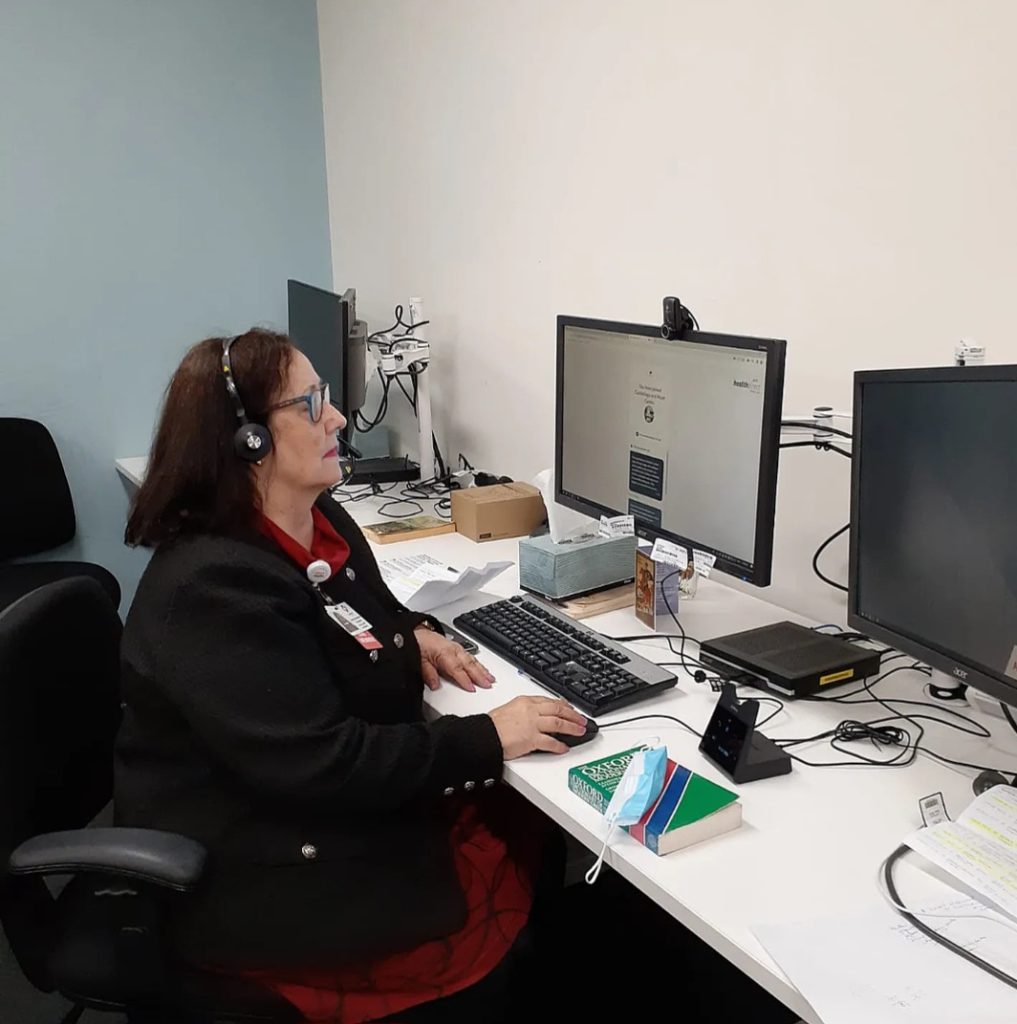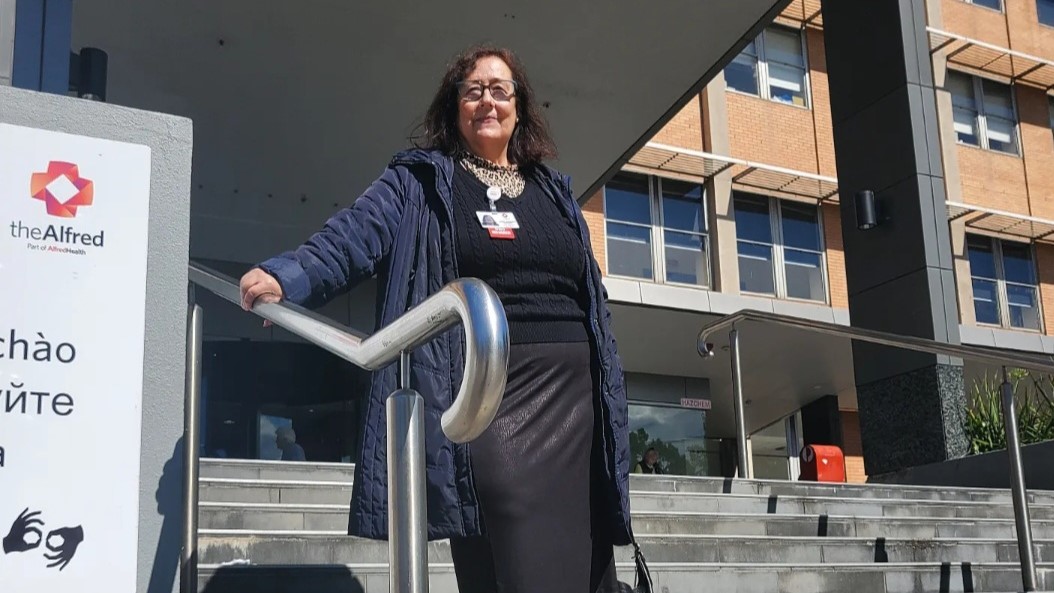Soula Tousimis celebrated her 25th working anniversary at The Alfred hospital in Melbourne, Victoria on June 11, 2021.
“Where did the years go?” she says, her voice slightly worn.
Despite the rewarding nature of the medical career milestone, Soula’s recollection of what she has experienced in her role tells a story of what she describes as a “home away from home” and “more than just a job.”
At the age of 11, Soula arrived in Australia after bidding farewell to her home in Greece, family by her side, not understanding a word of English. She attended Westgarth Street Primary School shortly after settling in to her new house in the northern suburbs of Melbourne, where her language skills were initially cultivated.
Her parents, both in their mid-forties at the time, relied on her voice and what she was learning at school in order to, in her words, “live.” She became the “interpreter” of her household, already taking on a role from a young age that she had no idea would one day become her life’s legacy.
Now 65, Soula is one of The Alfred hospital’s three Greek interpreters – a household name in her department. She was honoured with her 25 years of service by The Alfred hospital almost two years ago. Since then, she has only seasoned her skills further.
Soula shared some of her experiences with The Alfred’s Communications Team in March of this year, spreading insight regarding her versatile role during the hospital’s cultural diversity week.
She not only works alongside doctors and nurses, but forms an integral part of what is known as ‘Allied Health,’ a greater team made up of social workers, occupational therapists, speech pathologists, physiotherapists, other interpreters and translators. The families of patients are also involved in her everyday work, supporting their loved one while constantly observing the accuracy in language delivery of the interpreter.
Soula has also been a member of the Health Workers Union for 20 of her 26 years at The Alfred which, she says, has further “enriched her role and overall experience.”
“Through the union I was granted the capacity to advocate for my job in ways that addressed and fought to maintain fair working conditions, especially during the peak of the pandemic,” Soula says.

‘Without knowing the language, it’s like walking blindfolded’:
I ask Soula whether she would make the choice to become an interpreter if she could go back and do it all over again. She flashes a bright grin and without any hesitation says “yes,” while putting two thumbs up.
“I found a family away from family… they understood what it was like to grow up in Australia without a strong level of English and how that feels,” she says.
In fact, she attributes her interpreting role to the specialised level of both Greek and English that she uses interchangeably today, her constantly evolving skills in communication and overall confidence with others.
“Without knowing the language, it’s like walking blindfolded,” Soula says. “When I learnt how to communicate, I wanted to help others communicate, too… to pay it forward.”
As for the challenges involved in her work, the act of giving your own view is not allowed and “acting like a machine” that “transmits information” is what she describes as “necessary.”
There’s a sense of fearlessness in her voice as she discusses the “duty of care” to her patients, mentioning the importance of clear interpretation while acting as the “bridge between patients and health care professionals,” as it can “make the difference between life and death.”
Soula, looking out of the window with a distant expression in her eyes, reminisces on her varied days at the hospital, recalling her medical journey over the two plus decades.
From her first days as an interpreter and the introductions of angiograms, to witnessing valve replacements live at the hands of specialised surgeons, the medical education obtained in practice, she declares, has added even further to her list of previous academic achievements. She undertook and completed studies at multiple universities earning her a Diploma in Interpreting and Translating from RMIT, a Bachelor of Arts from Latrobe, and a Postgraduate Diploma of Education from the University of Melbourne.
“I never thought that I’d become an interpreter until I completed my first Diploma which led me to further studies… looking back on it all now it actually made sense all along,” she laughs.

‘We have had to tell patients to stop breathing…’
At the age of 38, Soula took a chance and surrendered to a role that gave her more than she ever dreamed.
“I was the only Greek interpreter when I joined The Alfred in 1996… now with our team of three, plus the other four interpreters registered with different languages… it feels like a little family. It’s one of the many reasons I love the job,” she says.
After so many years in the position, Soula reveals that many people today still don’t know much about the lengths that interpreters go to in order to support other health professionals and their patients.
During her appointments where patients are undergoing heart procedures, she is legally required to be present, dressed in full PPE gear including a led apron and collar to ensure protection from radiation coming from the medical equipment.
“There are times where my team and I have had to tell patients to stop breathing in order to be still for an x-ray scan. Interpreters have a lot weighing on their shoulders, even more so in recent times due to COVID-19,” she says.
Soula is keen to stress that the developments in technology during the pandemic have also added to the expectations of the role.
“We went from face-to-face, to phone-to-face… this took me a little getting used to as I’m not as confident with my digital skills, but I have learnt so much,” Soula explains.
The ‘Video Interpreting Project’ alongside ‘a new in-house telephone interpreting service’ was established, maximising the use of technology through ‘telehealth’ appointments and further utilising the skills of existing interpreters. Soula realised that this innovation also meant a slight change was needed regarding the way that her skills would be expressed.
“You’re not only passing on words, you’re passing on their (patients) feelings too. Through phone and video conferencing it increases the challenge. I found that it really tested my abilities and reaffirmed my professional boundaries which helped me find a revitalised sense of safety,” she says.
According to the Victorian Healthcare Experience Survey (VHES) conducted as part of The Alfred Health Annual Record 2021, 92% of patients reported their overall quality of care as either good or very good. Similar results have been found for the 2022 Annual Record.
Soula has to drive to work but before she leaves, she shares with me her tips for those who want to know what it takes to be an interpreter. She pauses briefly, tucking at her badge before saying, “you have to be impartial, that’s first… then comes compassion, dedication, accuracy, a strong desire to help people and overall – endurance.”
She adds: “If it’s in a hospital environment, you can’t be afraid of hospitals and blood… you must feel at home when you enter the grounds of a hospital. During a bone marrow biopsy, months ago, a new nurse advised me not to come into the procedure just in case I fell ill. I told her that I hadn’t fainted in almost 26 years.”
She takes a huge breath in before mentioning: “It’s challenging and every day is emotionally exhausting. You really have to love it and enjoy working with people. For me, it’s been an absolute privilege and an honour.”
*The role of an interpreter in accordance with the Department of Health and Human Services Victoria can be found here: https://bit.ly/42mFTiR

